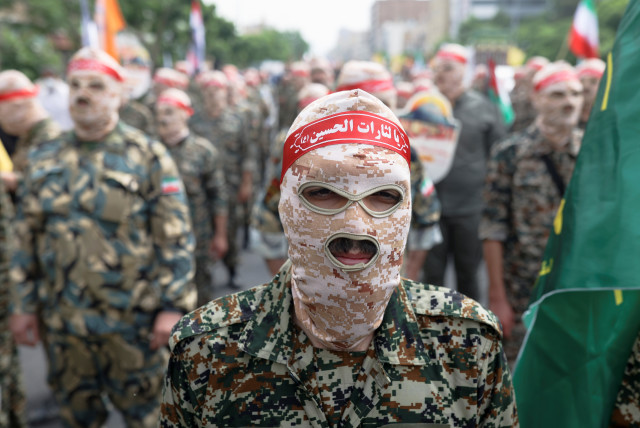We must monitor Iran’s gaze toward Jordan - opinion

Given the strategic importance of Jordan in the Middle East, it is imperative to closely monitor Iran’s actions and alliances by supporting Jordan’s stability through diplomatic and economic means.
As the intricate web of Middle Eastern politics continues to evolve, a new and potentially transformative dynamic is emerging.
The Islamic Republic of Iran, home to a regime that proudly and overtly has a narrative geared toward export and hegemonic ambitions, appears to be setting its sights on Jordan, a move that could have profound implications for the Middle East and beyond.
This potential shift in Iran’s focus on Jordan is more than just a geopolitical maneuver.
Altering the regional balance of power
It’s a strategy that could significantly alter the regional balance of power, challenging the established positions of key players such as Saudi Arabia and Israel. The impact of this could have a ripple effect far beyond the borders of these nations, touching on broader global security concerns and the strategic calculations of major world powers.
Iran’s strategy, we must remember, very much resembles the calculated moves of a predator stalking its prey amid internal strife. The Islamic Republic has a track record of exploiting internal conflicts within nations, intensifying and fueling tensions to facilitate their gradual takeover – Syria and Iraq standing out as stark testaments to this approach.
Such tactics are not merely opportunistic; they reflect a deeper, more ambitious blueprint laid out by Iran’s former leader Ayatollah Ruhollah Khomeini. His vision following the overthrow of the Shah was not just for a transformed Iran but for a shift in the Islamic world’s epicenter from Sunni-dominated Mecca to a Shia-centric leadership.
In this grand strategic design, Saudi Arabia looms as a coveted, albeit distant, prize – a goal Iran’s current capabilities and geopolitical realities render unattainable. However, the strategy to isolate and weaken the Saudi kingdom could very well begin with extending influence to neighboring states, such as Jordan.
Claiming influence over Amman, a capital with significant historical and religious prestige, could be a pivotal step in Tehran’s long-term regional ambitions – particularly because Jordan holds the esteemed title of custodian of Jerusalem’s holy sites, a role that Ayatollah Khamenei and the Iranian regime see as the jewel of their quest to realign the Islamic world’s leadership.
Jordan’s intricate historical and demographic tapestry, marked by its substantial Palestinian refugee population and alliances with Sunni powers, presents a nuanced and fertile ground for Iran’s strategic maneuvering.
Predicting the trajectory of Iran’s ambitions in Jordan involves navigating a maze of regional complexities and strategic calculations. While it is challenging to pinpoint a specific timeline or outcome, current trends and Iran’s historical patterns suggest a gradual, deliberate approach.
This strategy aligns with Iran’s wider regional objectives and its longstanding practice of expanding influence across the Middle East. The road to Mecca – metaphorically and geopolitically – may well pass through Amman if Iran’s regime’s ambitions in Jordan come to fruition, altering the Middle Eastern geopolitical landscape in profound and perhaps irreversible ways.
The significance of this development for regional stability cannot be understated.
Iran’s potential objectives in seeking influence over Jordan are multifaceted.
By undermining the Hashemite Kingdom, Iran would strategically challenge Saudi Arabia’s prominence in the region and the Islamic world. This move would represent a significant shift in the religious-political dynamics of the Middle East, given Jordan’s custodianship of key Islamic sites in Jerusalem and its Hashemite lineage tracing back to the prophet Mohammed.
THE RECENT escalation of hostilities by Hamas against Israel could, within this optic, serve a dual purpose. Beyond portraying Israel as vulnerable, these attacks might be a prelude to a broader regional conflict drawing in neighboring powers, notably Jordan.
The potential mass movement of Palestinians into Jordan, spurred by Israel’s crackdown against radical elements in Judea and Samaria, would significantly strain Jordan’s socio-political fabric, offering Iran a ripe opportunity to exert influence.
If one looks back at the Houthis’s long match towards Sana’a back in early 2015 (during the Yemen Civil War), a few months before Saudi Arabia decided to declare war on the Shia rebel outfit, a similar move against Amman may not be so far-fetched.
Iran’s geopolitical strategies in the Middle East, particularly its involvement in conflict zones such as Iraq, Syria, Lebanon, and Yemen, illustrate its expansionist policies.
The roles of Al Quds Force and proxies such as Hezbollah underscore Iran’s preference for indirect, asymmetrical methods of influence. In the context of Jordan, which has historically maintained a cautious relationship with Iran, Tehran’s approach would likely be more nuanced, exploiting internal vulnerabilities rather than direct confrontation.
The Hashemite Kingdom, with its unique historical and religious significance, faces the challenge of navigating complex political dynamics. The management of Palestinian refugees and the Hashemite Kingdom’s alignment with Saudi Arabia are critical elements in maintaining its stability. Any significant shift in Jordan’s political landscape, influenced by external powers like Iran, could have profound implications for regional security.
The prospect of Iranian influence in Jordan invites several scenarios, each with its own set of regional and global implications. For Saudi Arabia, it would represent a direct challenge to its regional authority, notwithstanding almost complete geographical isolation before the infamous Axis of Resistance. For Israel, it could mean heightened security concerns and a reevaluation of strategic priorities.
For Western powers the risk posed to strategic waterways in the Red Sea and the Strait of Hormuz could prove catastrophic – and all due to a collective refusal to grasp the true nature of the mullahs’ hegemonic ambitions.
AS WORLD capitals busy themselves debating the Palestinian cause, arguing Israel’s right to self-defend, Tehran is tightening its grip over the region, slowly choking those powers who can still resist its influence. The real danger here lies in the West’s myopic view of regional dynamics.
The response of global powers, particularly the United States and European countries, would be critical in counterbalancing Iran’s influence and preserving Jordan’s stability.
Given the strategic importance of Jordan in the Middle East, it is imperative to closely monitor Iran’s actions and alliances by supporting Jordan’s stability through diplomatic and economic means. Engaging in proactive regional diplomacy and countering extremist narratives are essential strategies.
Further research should focus on Iran’s proxy networks, Jordan’s internal political dynamics, and evolving regional alliances to provide a deeper understanding of the potential shifts in the Middle Eastern geopolitical landscape. To dismiss Tehran’s ambitions by limiting our analysis to the immediate threat posed to the State of Israel would be folly.
The writer is director of Forward Strategy Ltd. and a research fellow at the American Center for Levant Studies (ACLS).
Jerusalem Post Store
`; document.getElementById("linkPremium").innerHTML = cont; var divWithLink = document.getElementById("premium-link"); if (divWithLink !== null && divWithLink !== 'undefined') { divWithLink.style.border = "solid 1px #cb0f3e"; divWithLink.style.textAlign = "center"; divWithLink.style.marginBottom = "15px"; divWithLink.style.marginTop = "15px"; divWithLink.style.width = "100%"; divWithLink.style.backgroundColor = "#122952"; divWithLink.style.color = "#ffffff"; divWithLink.style.lineHeight = "1.5"; } } (function (v, i) { });

